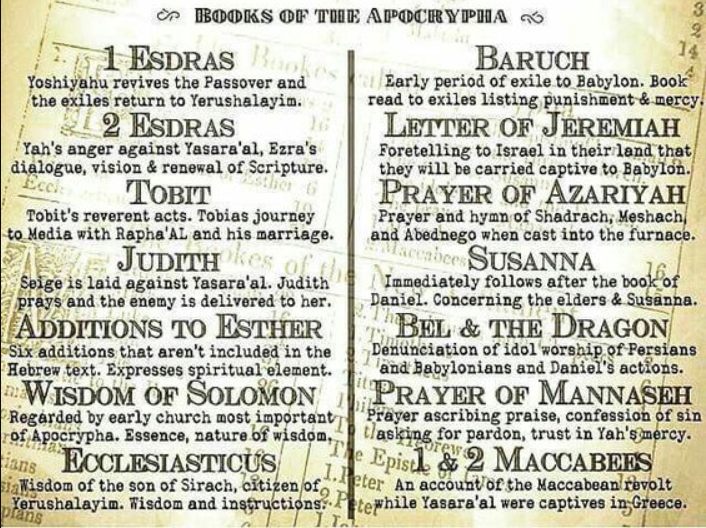See also The Book of Enoch and Other Odd Bibles on DVDrom and Over 320 Forbidden and Lost Books of the Bible on DVDROM (Apocrypha)
Today in History: The final session of the Council of Trent was held on this day in 1563. A significant part of this Catholic council was the confirmation that the Deutero-canonical books (the Apocrypha/Lost Books of the Bible) was on par with the other books of the Bible canon...and that Jerome's Latin translation, the Vulgate, was to be authoritative for the text of Scripture, contrary to Protestant views that the Greek and Hebrew texts were more authoritative.
These days though Catholics no longer use Jerome's Vulgate, opting instead for the Greek and Hebrew texts. If you're wondering what the Deutero-canonical/apocryphal books of the Bible are, you can simply compare the table of contents in a Catholic Bible with that of a Protestant one. The Catholic Bible has more books in their Bibles. For instance, a Catholic Bible will contain the books of Tobit, Judith, 1 Maccabees and 2 Maccabees, Wisdom, Sirach, and Baruch while a Protestant Bible will not. The Protestant King James Bible actually had the apocryphal books when it first came out in 1611 (1 Esdras, 2 Esdras, Tobit, Judith, Additions to Esther, Wisdom of Solomon, Ecclesiasticus, Letter of Jeremiah, Prayer of Azariah, Susanna, Bel and the Dragon, Prayer of Manasseh, 1 Maccabees 2 Maccabees and Baruch). The Five Gospels by the Jesus Seminar includes the Gospel of Thomas.
Some of these books can be entertaining. For instance, Bel and the Dragon was the first locked room mystery, and the Story of Susanna is the oldest court room drama. The very first translation of the Bible, the Septuagint (280 BC) contained the Apocrypha, and it is believed that the New Testament quotes from the Apocrypha in a few places. I have personally collected over 320 apocryphal Bible books.
The first translation of the Bible was the Septuagint (LXX) and it was made in the 3rd century before Christ. It had many apocryphal books, and some of the early Church Fathers accepted the apocrypha as part of the Bible canon. "They frequently paraphrased portions of the Apocrypha and even call the writer of 2 Esdras 'another of the prophets' (Epistle of Barnabas 12:1). During Origen’s day, the Apocrypha became a normal part of the liturgy in church. But by the time Augustine and Jerome came on the scene, two opposing views emerged on these writings. Augustine argued for the canonicity of the Apocrypha, drawing from it frequently in his writings. Jerome, however, pushed back and distinguished between canonical and ecclesiastical texts. Canonical texts informed faith and practice, but ecclesiastical texts were to be read in the church solely for edification, not to construct doctrine." Source
See also Over 100 Lost, Hidden, & Strange Books of the Bible on DVDROM (Gnostics, Gospels), and Over 180 Forbidden & Lost Books of the Bible on CDROM


No comments:
Post a Comment